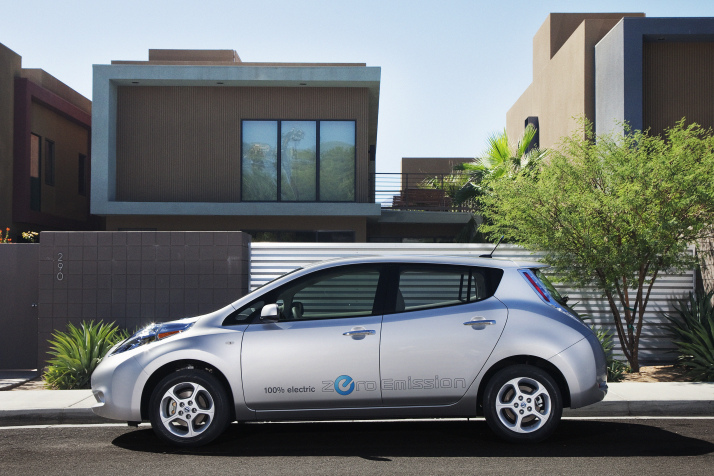For the first time in 80 years or so, major automakers are building and selling plug-in electric cars in the U.S.
How are they letting people know about their new cars? Advertising, of course.
Our colleague Richard Read looked at four electric-car TV ads, analyzing what made them work and what messages they tried to convey.
Gas bad, electrons good
Remarkably, three of the ads, from three different carmakers, conveyed identical messages: Gasoline is bad and dirty, electricity is clean and better...and wouldn't you want a car that plugged in rather than burning nasty, filthy petroleum?

2011 Chevrolet Volt drive test, March 2011
That theme, however, poses a bit of a problem for the 2011 Chevrolet Volt.
It's a plug-in car that also carries a gasoline-powered range extender to generate electricity on the fly during trips that exceed the 25- to 40-mile range of its battery pack.
The Volt, in other words, is a plug-in electric car that also burns gasoline. Which has led to some sharp words being exchanged between Nissan and Chevy, with their TV ads as proxies.
'More car than electric'
It started with Chevy, which launched the Volt with the tagline "It's more car than electric."
Some electric-car purists interpreted this as a slap at electric cars, saying that while maybe electric cars were OK, the Volt was better because it used gasoline too.
Certainly the "Anthem" ad below, first shown last autumn, says relatively little about electricity, and a lot about long road trips and the American values of spontaneity and freedom.
A couple of weeks ago, Nissan took off the gloves. It retired its famous polar bear spot, responding with a new ad, "Gas powered everything". It shows a Chevy Volt driver unhappily filling up the car at a gas station while a driver across the street unplugs his Leaf and drives happily away on electricity.
That commercial appears to have stung GM. The company's Rob Peterson was quoted in trade journal Automotive News calling the Nissan ad "entertaining" but both "misleading and damaging to the EV movement."
GM: Leaf a 'limited use vehicle'
Peterson noted in an e-mail that many buyers are "intrigued by pure electric cars," but suggested that "not many people are willing or have the means" to buy what he called a "limited use vehicle," presumably the Leaf, with its 70- to 100-mile range.

2011 Nissan Leaf
And he described the hypothetical situation of "a Leaf driver who uses all of the battery power and is unable to get a recharge," who would then have to be rescued by a "gas-powered tow truck or rental car." The Volt, he noted, could simply continue on using its gasoline generator.
While all of that is accurate, it sounded a tad defensive.
For input on how to think about these competing visions of electric cars, we turned to Chelsea Sexton, longtime advocate and perceptive commentator on all things vehicular and electric.
OK with the jabs
"I generally like the feistiness each company displayed in their ads," she wrote. "After years of these guys being ashamed and apologetic about their electric cars, I'm thrilled to see them proud enough to market them with spirit."

2011 Chevrolet Volt
"Within reason, I'm OK with the jabs, both in the advertising and in their comments to the media."
But then Sexton pivoted, turning on Nissan. Their latest ad "misleads the public about what the Volt (and plug-in hybrids in general) are," she said, "implying that it only runs on gasoline, or at least needs gas to run."
Confusing consumers?
Car buyers are still at the very earliest stages of learning about cars that plug in and run on electricity, she pointed out.
And Sexton worried that "confused consumers who think electric cars won't work for them--but who would consider a plug-in hybrid" could be misled by some of these ads into thinking that plug-in hybrids are just glorified gasoline cars, and not worth the added price.
So, she concluded, "I can see where the GM folks are frustrated right about now."
Sexton hastened to add that she doesn't agree with everything they say, "but I get how they got to the point" of having to say it.
Let the games continue.
+++++++++++













